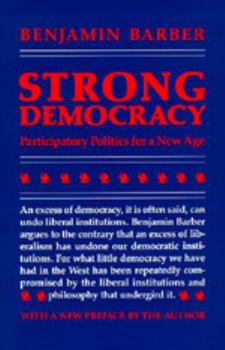Strong Democracy: Participatory Politics for a New Age
Select Format
Select Condition 
Book Overview
Since its appearance twenty years ago, Benjamin R. Barber's Strong Democracy has been one of the primary standards against which political science thinking and writing is measured. Defined as the... This description may be from another edition of this product.
Format:Paperback
Language:English
ISBN:0520056167
ISBN13:9780520056169
Release Date:October 1985
Publisher:University of California Press
Length:320 Pages
Weight:0.95 lbs.
Dimensions:0.8" x 5.9" x 8.9"
Customer Reviews
2 ratings
Strong Idealism
Published by Thriftbooks.com User , 20 years ago
As a student of politics I found this book intriguing. Barber's understanding of the importance of small-town/local bureaucracy is something missing from our liberal democratic understanding of politics. Barber draws from many different schools of Social Contract Theory, making a well rounded argument--until he hits national politics. His argument is interesting, and although it would never be realistically applicable in it's entirety--portions of his argument could be used to manage the socio-economic stratification issues in the United States. Barber is a good read for those interested in interpreting contemporary politics from a traditional standpoint, in new and innovative ways.
Strong versus Thin Democracy
Published by Thriftbooks.com User , 22 years ago
Beginning with a frontal attack on the liberal democratic theory, which is grounded on and ramified from epistemological premises that are largely pre-historical and pre-theoretical, and stretching to the practical propositions aiming and helping to create a new sense of citizenship and community, Barber produces a masterpiece that can be perused over and over again. Well cognizant of the problems created by the heavy emphasis of liberal democratic theory on atomized individualism, through which social system is deemed not more than the competing atoms who are presupposed in permanent fight to all others, Barber packages his arguments in a highly pragmatic bag that goes far beyond the kind of demagogic platitude. I read a number of books whose focus is on how to develop a strong democracy in both national and grass-roots levels, some of which are set on either pure theory or practice lacking ideational power. Strong democracy discerns itself from those that were written in the similar veins in that Barber knits all his arguments together cleverly based on both epistemological and practical weaknesses of what he objects, from which Barber's thesis comes, and practical ways toward and the tools for what he advocates: strong democracy. Barber persuasively displays the importance of citizenship that is closely linked to and associated with the active engagement and participation in the affairs of community to promote the betterment of the commune of which individual citizen is a part. As a response to the unceasing preoccupation of liberal theory with pre-historical and pre-theoretical epistemology taken to practice, Barber points to the very import of community that defines the specifics and boundaries of what liberal theory takes for granted such as liberty and equality, so, the community is rendered much more than the mere sum of individual interests. That is, community is designated as a medium that is congenial to create new perspectives passing beyond the interests and ideas of individual citizens. Barber comes up with a vision under which free individuals of community would convene for the purpose of revealing and dialoguing the common problems facing the community. The community in Barber's vision is a pragmatic one, hardly dependent on any overarching set of pre-historical principles. The book is organized around ten chapters, the first five of which deal with the core assumptions and frames (pre-conceptual, epistemological and psychological frames) of liberal theory, thereby Barber displays how liberal theory has misguided the practice of democracy in the twentieth century, with consequences being the anomie on the part of citizens and thin democracy in general. The last five chapters are spent for developing theory for strong democracy, the kind of democracy sharing less commonality with liberal representative democracy. In the lexicon of the book, the more the individual participates in the affairs of community, the more the individual be






